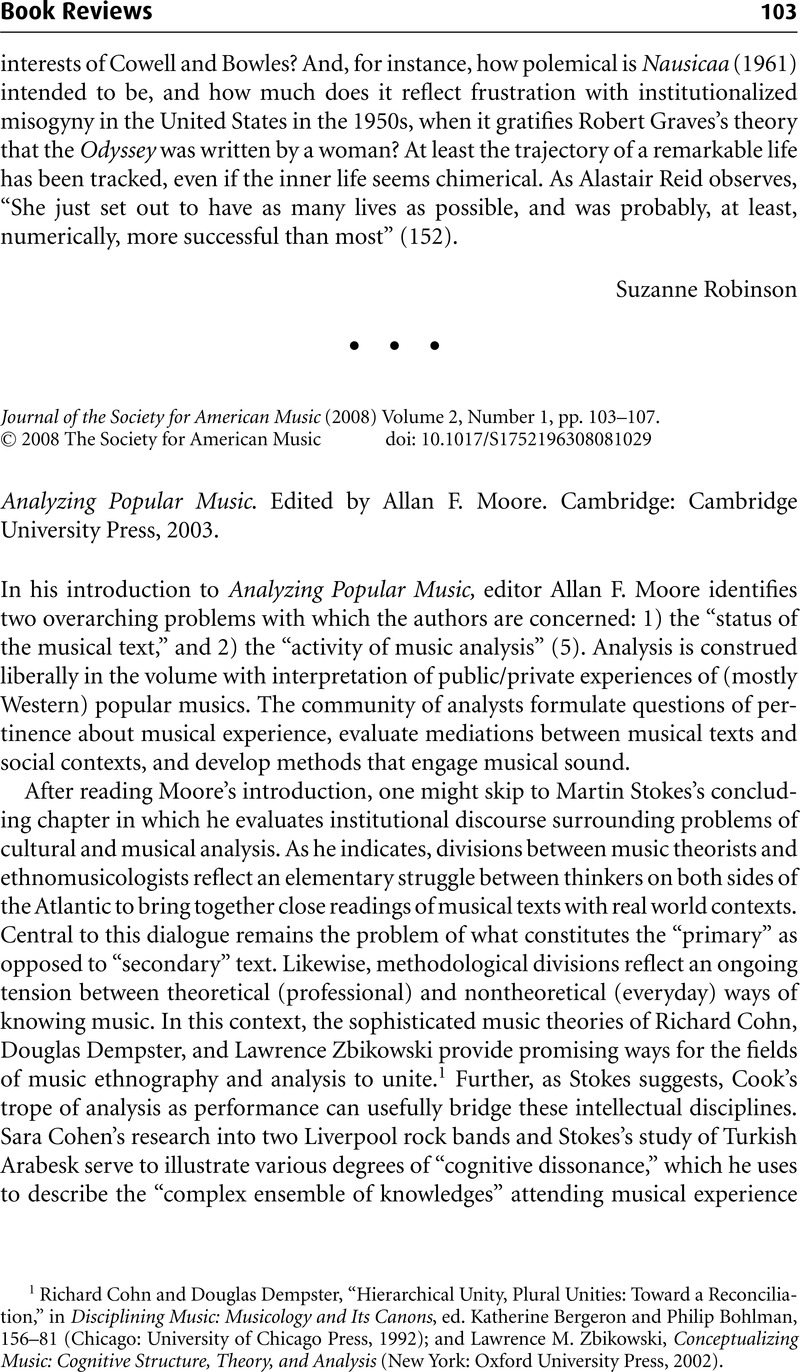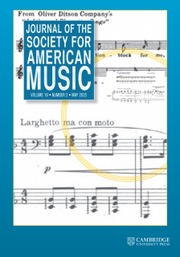No CrossRef data available.
Article contents
Analyzing Popular Music. Edited by Allan F. Moore. Cambridge: Cambridge University Press, 2003.
Published online by Cambridge University Press: 25 January 2008
Abstract

- Type
- Book Review
- Information
- Copyright
- Copyright © The Society for American Music 2008
References
1 Richard, Cohn and Douglas, Dempster, “Hierarchical Unity, Plural Unities: Toward a Reconciliation,” in Disciplining Music: Musicology and Its Canons, ed. Katherine, Bergeron and Philip, Bohlman, 156–81 (Chicago: University of Chicago Press, 1992)Google Scholar; and Zbikowski, Lawrence M., Conceptualizing Music: Cognitive Structure, Theory, and Analysis (New York: Oxford University Press, 2002)CrossRefGoogle Scholar.
2 Sara, Cohen, Rock Culture in Liverpool: Popular Music in the Making (New York: Oxford University Press, 1991)Google Scholar; Stokes, Martin, The Arabesk Debate: Music and Musicians in Modern Turkey (New York: Oxford University Press, 1992)Google Scholar.
3 See also Robert, Walser and Susan, McClary, “Start Making Sense! Musicology Wrestles with Rock,” in On Record: Rock, Pop and the Written Word, ed. Simon, Frith and Andrew, Goodwin, 277–92 (New York: Routledge, 1990).Google Scholar
4 Richard, Middleton, Studying Popular Music (Buckingham: Open University Press, 1990), 227–28.Google Scholar
5 John Covach, “Musical Worlding: Heidegger's Fundamental Ontology and the Understanding of Music,” Methods: A Journal for Human Science (1994): 49–58; and “Schoenberg's Turn to an ‘Other’ World,” Music Theory Online 1/5 (September 1995), http://mto.societymusictheory.org/issues/mto.95.1.5/mto.95.1.5.covach.art.
6 See Rose, Rosengard Subotnik, Deconstructive Variations: Music and Reason in Western Society (Minneapolis: University of Minnesota Press, 1996)Google Scholar. In chapter 3, she problematizes the long-standing opposition between structure and medium in Western musical thought. Subotnik's influence is set forth in Beyond Structural Listening?: Postmodern Modes of Hearing, ed. Andrew Dell'Antonio (Berkeley: University of California Press, 2004). See also Zak, Albin, The Poetics of Rock: Cutting Tracks, Making Records (Berkeley: University of California Press, 2001)CrossRefGoogle Scholar, and Bowman in this collection.
7 David, Harvey, The Condition of Postmodernity (Cambridge: Blackwell, 1990), 339.Google Scholar
8 See also Adam, Krims, Rap Music and the Poetics of Identity (New York: Cambridge University Press, 2000).Google Scholar
9 Music/Ideology: Resisting the Aesthetic, ed. Adam Krims and Henry Klumpenhouwer (Amsterdam: G+B Arts International, 1998). Two additional collections whose ideological motivations overlap with Moore's as evident in Analyzing Popular Music are Rethinking Music, ed. Nicholas Cook and Mark Everist (Oxford: Oxford University Press, 1999); and Dell'Antonio, Beyond Structural Listening?




